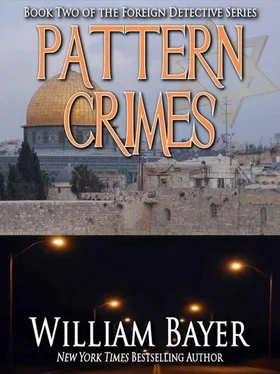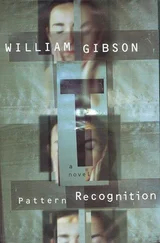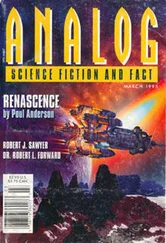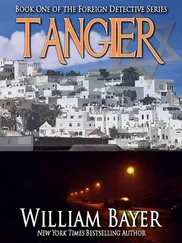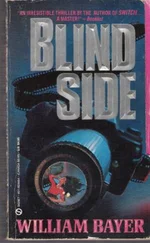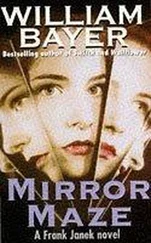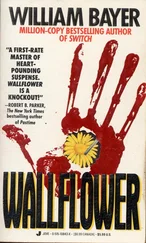WIlliam Bayer - Pattern crimes
Здесь есть возможность читать онлайн «WIlliam Bayer - Pattern crimes» весь текст электронной книги совершенно бесплатно (целиком полную версию без сокращений). В некоторых случаях можно слушать аудио, скачать через торрент в формате fb2 и присутствует краткое содержание. Жанр: Полицейский детектив, на английском языке. Описание произведения, (предисловие) а так же отзывы посетителей доступны на портале библиотеки ЛибКат.
- Название:Pattern crimes
- Автор:
- Жанр:
- Год:неизвестен
- ISBN:нет данных
- Рейтинг книги:3 / 5. Голосов: 1
-
Избранное:Добавить в избранное
- Отзывы:
-
Ваша оценка:
- 60
- 1
- 2
- 3
- 4
- 5
Pattern crimes: краткое содержание, описание и аннотация
Предлагаем к чтению аннотацию, описание, краткое содержание или предисловие (зависит от того, что написал сам автор книги «Pattern crimes»). Если вы не нашли необходимую информацию о книге — напишите в комментариях, мы постараемся отыскать её.
Pattern crimes — читать онлайн бесплатно полную книгу (весь текст) целиком
Ниже представлен текст книги, разбитый по страницам. Система сохранения места последней прочитанной страницы, позволяет с удобством читать онлайн бесплатно книгу «Pattern crimes», без необходимости каждый раз заново искать на чём Вы остановились. Поставьте закладку, и сможете в любой момент перейти на страницу, на которой закончили чтение.
Интервал:
Закладка:
"This is the way you like it, isn't it? Isn't it?" she hissed. "The way you did it all those times with Stephanie. Wrestling with her. That bitch! That Lynx!"
He was sitting now smoothing out his clothing, while she sat in a chair opposite and formally presented her report.
"Sasha says Sergei received a grant from an American foundation. It was to design some kind of abstract environmental sculpture in the Negev. The thing's actually been built-Sasha's gone out there twice to look at it. He says it's a phony: Sergei didn't design it, and Sasha doesn't even think it's a work of art. He wouldn't care except that Sergei made such a big point of telling him he'd created it and boasted to him about how big it was. So after following Sergei around for several days, he decided to put on some pressure. It seemed to work. Sergei took off, and Rokovsky followed him to the offices of that foundation where he overheard him demanding extra money."
"From Ephraim Cohen?"
"Rokovsky doesn't know. He never saw the other man. And since he doesn't speak Hebrew he could barely make out what they were saying."
"But he's certain Sergei asked for money?"
"Yes, and that he was very angry too. The other man tried to mollify him. Rokovsky, by the way, was very frightened when Liederman stopped him in the dark."
For a few moments David gazed at her. His silent intensity always fascinated her-she could sense the wheels turning in his brain. Finally he spoke: "How did Sasha pressure him?"
"Apparently by handing him a stack of Polaroids, ones he'd taken at the site. And then by taunting him and telling him straight out he knew the sculpture was a fraud."
"That's it?"
"Pretty much. I didn't tell him about your case. Just that you'd been interested in what he'd told me and asked me to find out more. He'd like to talk to you about it directly, David. He's obsessed with it." She smiled. "That's what struck me most of all."
"What?"
"The way you both feel-so strongly. This obsessive intensity about you both. You're different men, completely different in most every way. But in that you're nearly the same."
She had a secret: that when she played she could become the cello. She could enter into it until she merged with it, and then she could find the music, and then the music could flow out. That was the way she felt when she was playing well-that she was the cello, that there was no distinction between it and her, and that the music was not to be found on the sheets of the score, but deep inside, in the dark interior cavity of the instrument. The music, all the cello music ever written, was there, waiting for her to hear it, waiting to be released. Playing, then, became releasing-she was all that stood between the hearing of it and the silence; when she became the cello all she had to do was open up.
But now, for some reason, she could not become the cello. She was merely a cellist, as she had been when she was a student, before the secret had been revealed. I have no trouble opening up, she thought; I do that all the time with David. My trouble now is that I cannot become the cello. I must find my way back into it, squeeze myself back inside.
She decided that night that she would dream her way inside her instrument, and that when she did she would listen carefully to the music so that she would know how it must be played.
But it was very difficult to will herself a dream, and that night this dream she longed for did not come. Instead she dreamed of something else: two men, David and Sasha, moving on separate vectors toward a particular meeting point in space and time. But hard as she tried, she could not see the place of their convergence, though she could see very clearly that they were moving toward it at increasing speed.
DAVID'S DOGS
It was past midnight. Shoshana was posted on watch in the lobby at 28 Histadrut. Uri had the janitor and night watchman ensconced in a first floor office, while David, Micha and Dov set to work opening up room 304. The words "Holyland Arts Foundation" were stenciled in black on the frosted glass door. The lock was serious; Micha said he wouldn't be able to open it without leaving marks. But there was a transom, also made of frosted glass, which Dov felt certain he could breach, then fish through to catch and throw the bolt inside.
As Dov unscrewed the transom fixtures, Micha, who'd done preliminary research, filled David in.
"Very low-key type of operation. They buy up paintings and sculptures by Israeli artists, arrange shipment to the States, and then exhibit the works over there. They also make contributions to Israeli art schools, encourage exchange of art teachers, fund promising young Israeli artists, and occasionally commission a major work to be placed in a public location-a development town, say, or on an army base."
"So who's behind it?" David asked.
"Americans, some kind of Christian evangelist group. Been operating here close to three years. They pay their rent on time, never bother anybody and, according to their neighbors, seldom get visitors. The old mama-type who works in the front room is sweet and kind of dumb. She sits out there, smiles, and sorts the mail. Actually, since she's only here part-time, the place is mostly closed."
Once they were inside, however, David was disappointed: no hidden safe, no concealed tape recorders, no windows made of one-way glass. Just two small offices, both shabbily furnished-a waiting room with hard wooden chairs, a desk, a phone, and an answering machine, and an inner office with another desk, a metal filing cabinet, and on the walls photographs of various works of contemporary Israeli art.
He opened a drawer of the filing cabinet and started rifling through file folders. Most contained copies of letters between the Foundation's home office, in Dallas, and various Israeli galleries. He found one marked "Negev Earthwork: Circle in the Square." It was the only folder that was empty.
"Of course it's empty," Dov said. "It's the one we're interested in."
"Is this some kind of Shin Bet safe-house?" Micha asked.
"A good safe-house is a residence. Here, there's only access during business hours."
"Still it could be a front," Dov said. "Money gets sent in, art gets shipped out. It's looks like any one of a hundred little foreign religious charities. No one pays attention, because what they do is so ineffectual and nice."
"Maybe just a little too ineffectual," David said. "Question is: Is this a legitimate Shin Bet operation, or is it related somehow to our case? How's your English, Dov?"
"Damn good-you know that."
"Ever been to Dallas?"
Dov shook his head. Then suddenly he grinned. "Hey! You're kidding, David. You are, aren't you? Oh wow! Just turn me loose!"
Latsky bit into his lower lip. "Suppose it is a valid Shin Bet operation?"
"So what's the harm?" David asked. "All we want to do is check it out."
"Still…"
"Come on. What's bugging you? Is it the money?"
"I have a discretionary fund…"
"So what's the problem?"
"Too much of a long shot." Latsky squinted, then lit a cigarette. "You got some hearsay Cohen went in there. So what does that prove? Nothing." He squinted again, then exhaled. "You're floundering. Because you can't make head or tail out of this you want to dispatch twenty percent of your force to the goddam U.S.A."
"Give me five days. If Dov doesn't come up with anything I'll haul him back. He can hitch free on El Al far as New York, and from there-"
"Fine! Send him! Do whatever the hell you want. Since they found that executioner's' body you've been the minister's fair-haired boy." Latsky stubbed out his cigarette. "Just don't ask me for any written orders. As far as I'm concerned this meeting never happened. I never authorized anything. You're operating on your own."
Читать дальшеИнтервал:
Закладка:
Похожие книги на «Pattern crimes»
Представляем Вашему вниманию похожие книги на «Pattern crimes» списком для выбора. Мы отобрали схожую по названию и смыслу литературу в надежде предоставить читателям больше вариантов отыскать новые, интересные, ещё непрочитанные произведения.
Обсуждение, отзывы о книге «Pattern crimes» и просто собственные мнения читателей. Оставьте ваши комментарии, напишите, что Вы думаете о произведении, его смысле или главных героях. Укажите что конкретно понравилось, а что нет, и почему Вы так считаете.
